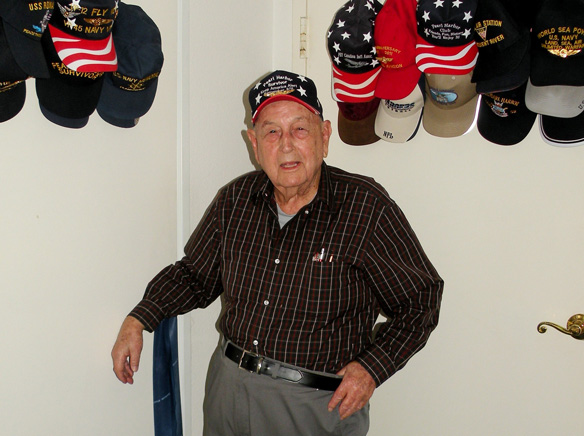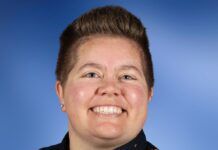A native of California, having grown up in Los Angeles, Doyle Mckee is one of the few remaining Pearl Harbor survivors. Having enlisted in the Navy at the age of 18, just six months before the Japanese bombed Pearl Harbor, Mckee ended up dedicating his life to the service for 37 years. Now a resident of Sun Garden Terrace, Mckee will be honored there at a ceremony on Veterans Day at the home.
Mckee said that at a recent church service held at Sun Garden Terrace, the pastor posed this question to the congregation: “If God gave you one favor, what would it be?”
A native of California, having grown up in Los Angeles, Doyle Mckee is one of the few remaining Pearl Harbor survivors. Having enlisted in the Navy at the age of 18, just six months before the Japanese bombed Pearl Harbor, Mckee ended up dedicating his life to the service for 37 years. Now a resident of Sun Garden Terrace, Mckee will be honored there at a ceremony on Veterans Day at the home.
Mckee said that at a recent church service held at Sun Garden Terrace, the pastor posed this question to the congregation: “If God gave you one favor, what would it be?”
To have the next 37 years as good as the ones he’d had in the Navy, answered Mckee. “The pastor said I must have really enjoyed being in the Navy. Yes, I did. I still have Navy blood in my veins,” he said, his eyes c crinkling up.
Mckee attributes much of his zest for life to Norman Vincent Peal’s power of positive thinking. “It’s got me to age 91,” he said.
Already armed as a young man with that kind of thinking, Mckee began his Navy career as a flight engineer at the Kaneohe Bay Naval Air Station on Oahu. On December 7, 1941, he heard some different-sounding aircraft fly over the base early that morning. He looked out his barracks window and saw fighter planes going a circle.
“They were strafing our planes. I could hear the burst of the guns,” Mckee said.
He recognized the Japanese insignia, since he’d been raised in Los Angeles, living among the Japanese, playing basketball with boys in the neighborhood.
“So I was already familiar with their flag, the Rising Sun,” he said.
Within five minutes after the first Japanese planes were spotted over the base, a voice came over the PA announcing that all Naval Aviation personnel report to their squadrons. Mckee went to work helping the injured out of the combat zone to a temporary First Aid station. Then he helped the fire department drag the hose all around the base to quench the fires.
“On that day, I did not get injured, but I developed an attitude toward the Navy. When I’d enlisted in the service, I had believed that the U.S. Navy was the most powerful in the world. I went in with my shoulders high and my chin up,” he said.
“But on December 7, my head went down, my shoulders fell. Only after my experience at Midway and receiving m Combat Promotion, did I realize that the Navy had given me 150%, and I was going to give them back 150%.”
During those rough times, Mckee picked up an expression that he began to use all the time, with respect to his Navy career. “Nothing is right that is short of being right,” he said. “That means that when I flew with a crew of twelve men, to survive, all of the people had to do their job.”
When people ask how he survived the emotional and mental trauma and escaped injury or death, he tells them he did it by sticking to positive thinking. “Every mission I started out on, I said to myself, ‘I’m coming back, I’m coming back.’ For at least fifteen minutes, I repeated that. So when people tell me I was just lucky, I say, ‘Okay, well, I was lucky and I was thinking positive.”
He worked himself up to the rate of E-7Chief as a Plane Captain for Multiple Engine Aircraft. “I got a lot of time in the air, over 9,000 hours,” he said.
During the Battle at Midway in June 1942, Mckee oversaw surveillance activities over enemy aircraft carriers. Surveillance included a wide seep of 25 to 30 miles along the coastline. Just as that battle was the turning point of the Pacific Sea War, so were those four days in Mckee’s life.
Although the U.S. Navy did lose one of its aircraft carriers, the USS Yorktown, US Navy squadrons managed to sink four Japanese carriers from which many of the enemy planes had taken off to bomb Pearl Harbor.
“After the Battle at Midway, I realized that the U.S. Naval Aviation was the king of the seas,” he said.
Following Midway, Mckee’s squadron commander had to retrain the young men, sending them to gunnery school. Mckee’s first assignment after the school was in Kauai. “We looked for Japanese sea craft, including submarines.
“I also looked for the barking sands that Kauai was famous for, but I never found them,” Mckee said.
Mckee was next assigned to the Guadalcanal Campaign, a “huge campaign of naval warfare,” he explained. His squadron photographed the pre-invasion activity of the enemy. Four 24-inch Kodak cameras were mounted on the plane looking down from 1,500 to 2,000 feet up.
“The photographs helped Intelligence figure out where to land and do our dirty work,” Mckee said.
After the two-year stint at Guadalcanal, Mckee was sent back to the Naval Air Station at Oakland, California. He was placed in a transportation squadron preparing for the land invasion of Japan. It was during this time that the base received notification that Japan had declared surrender. It was September, 1945.
“The Captain came out and informed us that everybody except the duty crew in the squadron was dismissed for three days. The celebrating we did in San Francisco was quite an experience for a young single guy like me. Everybody was out in the street hugging and kissing girls,” Mckee said.
Mckee stayed with the Navy, doing air surveillance for the Korean War. The big picture Mckee has formed out of his war experiences is that the military absolutely must be prepared and heed threats and warnings by other nations. “We need to know who our enemy is,” he said, pulling off his cap. He read the insignia aloud: “Keep America Alert. Remember 9/11.”
Mckee put his cap back on. “The Navy always treated me with honor, appreciated my initiative, leadership and honesty. I’ve carried all that into my civilian life through the power of positive thinking,” he said.
A cardboard cut-out of Mckee as a young enlisted man will be one of many featured in the ‘walking wall’ in the “Spirit of 45” Parade next May in San Diego. “I want to get that cardboard cut-out of myself after the parade,” Mckee said, chuckling.















Aw, this was an extremely
Aw, this was an extremely nice post. Taking a few minutes and actual effort to
generate a really good article? but what can I say? I procrastinate a whole lot and don’t seem
to get nearly anything done. https://www.novreg.ru/bitrix/redirect.php?event1=&event2=&event3=&goto=https://cryptoyaks.com/groups/good-health-starts-with-good-food-1901054486/